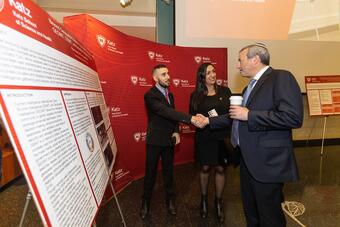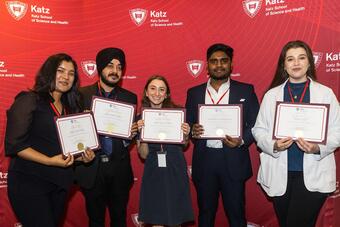Thirty graduate student teams presented research and scholarship that was novel, inspiring and in some cases life-saving at the Katz School’s 2024 Symposium on Science, Technology and Health at the Yeshiva University Museum.
The projects, drawn across the school’s graduate programs in STEM and Health Sciences, covered a range of subjects, including the development of a new peptide called JunAP that is important in cancer development and immune suppression; antifreeze proteins and peptides made by organisms that allow cells to survive in sub-zero conditions and figure into preserving food longer; the biology, genetics and cultivation methods of duckweed, which is being considered as a food source for astronauts; and the development of a method using Generative AI for labeling data and identifying antisemitic speech.
“The scholarship is an outcome of their extensive learning experiences, as well as the mentorship they received from faculty advisors, research collaborators and industry partners,” said Dr. Amiya Waldman-Levi, co-organizer of the event and clinical associate professor of occupational therapy. “We honor them for their commitment to education, collegiality and academic spirit.”
In addition to their faculty mentors from the Katz School and Yeshiva University, students assisted researchers at Albert Einstein College of Medicine, Colorado State University, Mercy University, Renal Research Institute, Afya Foundation and biotech startup Growmics. All of the student research will be published in a proceedings later this summer.
During the event, four student teams were recognized by the symposium’s scientific committee for the depth and quality of their scholarship with awards for:
*Outstanding Scholarship in STEM: Radek Holik, Ruslan Gokhman and Manish Kumar Thota (M.S. in Artificial Intelligence);
*Outstanding Scholarship in Health: Jessica Kwok and Rachel Hirsch (Occupational Therapy Doctorate);
*Overall Impact in STEM: Gagan Preet Singh and Karina Thapa (M.S. in Data Analytics & Visualization); and
*Overall Impact in Health: Simone Northman (M.S. in Physician Assistant Studies).
In addition, attendees voted to give Alaa Etouni, a student in the M.S. in Physician Assistant Studies, the “People’s Choice” award for her poster.
In addition to receiving awards, the four teams were invited to give short talks about their projects. Holik, Gokhman and Thota discussed their machine-learning chatbot that can assist students academically by acting as a digital brain that understands both images and questions and responds the way that the most knowledgeable professor would.
Kwok and Hirsch studied the impact of an eight-week healthy aging and wellness group program consisting of yoga, mindfulness and social practices delivered online and in-person to improve older adults’ sense of hope and well-being.
Singh and Thapa’s research aims to help Tanzanian farmers, impacted by climate change, increase their crop yields. The project, called Zeomancer, is a small, intelligent weather station installed in fields that collects environmental data on soil conditions and weather patterns.
Northman conducted a literature review of the safest treatment options for pregnant women with preeclampsia, a pregnancy complication characterized by high blood pressure and signs of damage to internal organs, most often the liver and kidneys.
In acknowledging student efforts, Yeshiva University President Ari Berman said that scientists and researchers must inform their work with humane values and that the scientific endeavor be conducted in “ways that best serve the purpose of all humanity.”
“I’m here to thank you and congratulate you on your achievements, which I know represent such an incredible personal accomplishment,” he said, “but for all of us at the university and broader society, you represent something greater. You are the hope that gives us belief in our future.”


